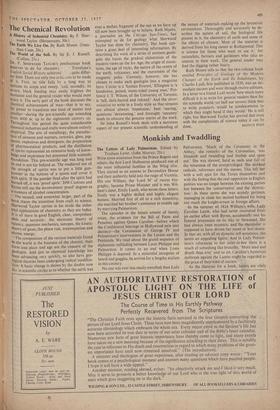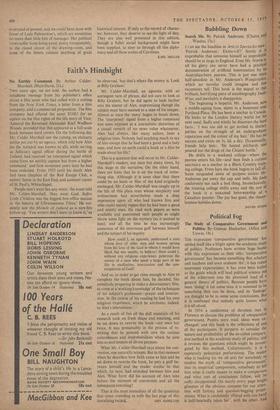Monkish and Twaddling
The Letters of Lady Palmerston. Edited ' by Tresham Lever. (John Murray, 28s.)
WITH some assistance from the Prince Regent and others, the first Lord Melbourne produced one of the most influential families in the Whig elite. They started as an annexe to Devonshire House and their authority held into the reign of Victoria. His son William, the 'Lord M' of recent bio- graphy, became Prime Minister and it was Wil- liam's sister, Emily Lamb, who wrote these letters. Emily was a highly skilled and highly .elegant hostess. Married first of all to a rich nonentity, she matched her brother's eminence in middle age by marrying Palmerston.
The episodes in the letters consist of family crises, the evidence for the Bill of Pains and Penalties against Queen Caroline—before which the Confidential hearings in Hollywood pale into decency—the Coronation of George IV and Palmerston's interventions in the Levant and the Peninsula. We read about the grand sequence of diplomatic enfilading between Louis Philippe and Palmerston. It comes to an end when Louis Philippe is deposed. In a mournful incognito of beard and goggles, he arrives for a lengthy asylum in this country.
No one wds ever less mealy-mouthed than Lady
Palmerston. 'Much of the Ceremony in the Abbey,' she remarks of the Coronation, 'was Monkish and twaddling and foolish and spun out.' She was shrewd, hard as nails and full of the bitterness of the overprivileged. She disliked radicals, reformers and the masses. This left her with a soft spot for the Tories themselves and with the feeling that the real opposition in English politics was no longer between the existing parties but between the 'conservative' and the 'destruc- tive.' In these terms she, was acutely partisan, managing to chide her second. husband for being too much the knight-errant in foreign affairs.
In the summer of 1824 William's, wife, Lady Caroline Lamb, who had never recovered from an earlier affair with Byron, accidentally met his funeral procession on its way to Newslead. She had always been eccentric and the encounter is supposed to have driven her more or less insane. In that set, with all its dynastic self-assurance, she seems an appealing figure. And in Lady Palmer- ston's references to her sister-in-law there is a touch of something like brutality. 'More mad and drunk than ever' and so on. Caroline's hysterical Outbreak against the Lambs might be regarded as the price of their kind of success.
As the Material for a book, letters are vilely overrated at present, and we could have done with fewer of Lady Palmerston's, which are sometimes no more than little bits of messages. Her political views suffer from being aired, 'pretty irresponsibly, in the closed circuit of the drawing-room, and none of the letters contain anything of great historical interest. If only as the record of charac- ter, however, they deserve to see the light of day. They are also well presented in ,this edition, though a fuller social background might have been supplied, to steer us through all this diplo- macy and all these scores of Carolines.
KARL MILLER



































 Previous page
Previous page